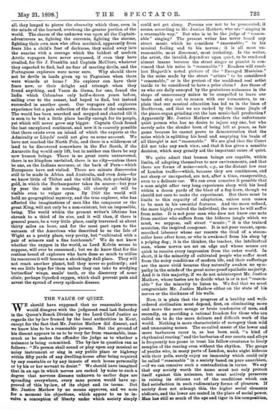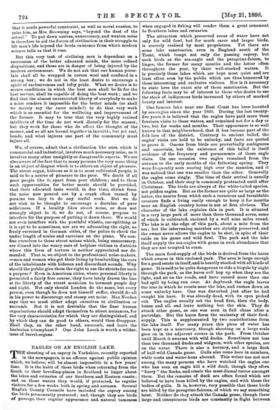THE VALUE OF QUIET.
WE should have supposed that no reasonable person would disagree with the judgment read last Saturday in the Queen's Bench Division by the Lord Chief Justice as regards the by-law framed by the local authorities in Kent, except for the fact that Mr. Justice Mathew did dissent, and we know him to be a reasonable person. But the ground of his dissent appears to us to be very far from reasonable, inas- much as he makes the offender the judge as to whether a nuisance is being committed. The by-law in question ran as follows : " No person shall sound or play upon any musical or noisy instrument or sing in any public place or highway within fifty yards of any dwelling-house after being required by any constable or by any inmate of such house personally or by his or her servant to desist." We should have imagined that in an age in which nerves are racked by noise to such a degree that nervous diseases unknown to earlier days are spreading everywhere, every sane person would have ap- proved of this by-law, of its object and its terms. But Mr. Justice Mathew by no means approves, and we note for a moment his objections, which appear to us to in- volve a conception of liberty under which society simply
could not get along. Persons are not to be prosecuted, it seems, according to Mr. Justice Mathew, who are " singing in a reasonable way." But who is to be the judge of " reason- able" singing? The present writer has never heard any street music which he considers "reasonable; " to his musical feeling and to his nerves ; it is all most un- reasonable, most dissonant, most irritating. Is the writer, the artist, the invalid, dependent upon quiet, to be rendered almost insane because the street singer or pianist is con- vinced that his noise is "reasonable " ? Readers will recol- lect Hogarth's noted picture of the " Enraged Musician." Is the noise made by the street " artists " to be considered "reasonable," or is the protest of the maddened real artist inside to be considered to have a prior claim ? Are those of us who are daily annoyed by the gratuitous nuisances in the shape of unnecessary noises to be compelled to leave our tasks and step out to reason with our tormentors, to ex- plain that our musical education has led us in the lines of Beethoven, and that we are racked by the inane jingle of the piano organ grinding out the last music-hall production! Apparently Mr. Justice Mathew considers the unfortunate quiet person who has no desire to injure any one, but who merely asks the slender boon of being left at peace, as fair game because he cannot prove to demonstration that the noise which is splitting his head and emptying his brain of all thought is not "reasonable." We are glad that the Court did not take any such view, and that it has given a sensible decision, which may greatly aid the important cause of quiet.
We quite admit that human beings are capable, within limits, of adapting themselves to new environments, and that there are forms of noise—such, e.g., as the distant low roar of London traffic—which, because they are continuous, and not sharp or unexpected, are not, after a time, exasperating, even to a delicate ear. We can even conceive it possible that a man might after very long experience sleep with his head within a dozen yards of the blast of a fog-horn, though we should not care to make the experiment. But there must be limits to this capacity of adaptation, unless man ceases to be man in his essential features. And the more refined, the more highly evolved the individual, the more he will suffer from noise. It is not your man who does not know one note from another who suffers from the hideous jangle which we must, we suppose, call street " music ; " it is the trained musician, the inspired composer. It is not your vacant, open- mouthed labourer whose ear resents the thud of a steam- roller hour after hour, or who is awakened from his sleep by a yelping dog ; it is the thinker, the teacher, the intellectual man, whose nerves are set on edge and whose senses are quick to receive every impression from the outer world. In short, it is the minority of cultivated people who suffer most from the noisy conditions of modern life, and their sufferings are the more vivid because they naturally awaken no sym- pathy in the minds of the great noise-proof apathetic majority. And it is this majority, if we do not misinterpret Mr. Justice Mathew, whose tastes are to decide what is or is not "reason- able " for the minority to listen to. We feel that we must congratulate Mr. Justice Mathew either on the state of his nerves or the thickness of his walls.
Now, it is plain that the progress of a healthy and well. ordered civilisation must depend, first, on eliminating more and more the mere savage or brute tendencies of man, and secondly, on providing a rational freedom for those who are called on to do the more delicate and difficult work of the world. Nothing is more characteristic of savagery than wild and unmeaning noises. The so-called music of the lower and more barbarous races is, as has been said, "a kind of rhythmical roaring," and the barbarian of our courts and alleys is frequently too prone to treat his fellow-creatures to lively samples of the roaring even without the rhythm. The gangs of youths who, in many parts of London, make night hideous with their yells, surely enjoy an immunity which could only be called " reasonable " in a society based on pure anarchism, —if we can conceive such a contradiction in terms. We say that any society worth the name must not only protect itself against this nuisance, but must actively persevere in raising its citizens out of the conditions which can find satisfaction in such rudimentary forms of pleasure. If society does not attempt this, the higher social elements abdicate, and the lower are seated in the place of social power. Man has still so much of the ape and tiger in his composition, that it needs powerful constraint, as well as moral suasion, to raise him, as Mrs. Browning says, "beyond the dust of the actual." To put down useless, unnecessary, and wanton noise is therefore to aid the forces of civilisation in their struggle to lift man's life beyond the brute existence from which modern science tells us that it rose.
But this very task of civilising men is dependent on a succession of the better educated minds, the more refined dispositions, and these are in danger of being injured by the modern environment. We do not ask that our human porce- lain shall all be wrapped in cotton wool and confined in a strong box ; we do not in the least desire to encourage a spirit of exclusiveness and lofty pride. What we desire is to secure conditions in which the best men shall be fit for the best service, shall be capable of doing the best work ; and we find that the almost unrestricted liberty of everybody to make a noise renders it impossible for the better minds (or shall we merely say the rarer minds ?) to do that very work which is so essential for the wellbeing and improvement of the former. It may be true that the very highly trained intellects of the time do not work directly for the masses ; but they work for those who do affect the thought of the masses, and so all are bound together in invisible, but yet real, bonds, and what injures one part of the community must injure all.
We, of course, admit that a civilisation like ours, which is commercial and industrial, involves much necessary noise, as it involves many other unsightly or diasgreeable aspects. We are also aware of the fact that to many persons the very same thing is an object of disgust which is to others an object of pleasure. The street organ, hideous as it is to most cultivated people, is said to be a source of pleasure to the poor. We doubt if all poor people like it, apart from poor children ; and to them such opportunities for better music should be provided, that their educated taste would, in due time, shrink from the noise now poured out by a crank often turned by persons too lazy to do any useful work. But we do not wish to be thought to encourage a doctrine of pure selfishness. If a locality likes street noise, or does not strongly object to it, we do not, of course, propose to interfere for the purpose of putting it down there. We would not even interfere with the youthful whistle, ear-splitting as it is apt to be sometimes, nor are we advocating the right, so freely exercised in German cities, of the police to check the undue length of scales and exercises on the piano. We con- fine ourselves to those street noises which, being unnecessary, are dinned into the weary ears of helpless victims in districts where this form of torture is neither appreciated nor de- manded. That is, we object to the professional noise-makers, —men and women who get their living by bombarding the ears of the inhabitants with hideous and discordant sounds. Why should the public give them the right to use the streets for such a purpose ? Even in American cities, where personal liberty is permitted a fairly free course, they have lately drawn the line at the liberty of the street musician to torment people day and night. Not only should London do the same, but every person, even though he does not himself suffer, should do all in his power to discourage and stamp out noise. Max Nordau says that we must either adapt ourselves to civilisation or succumb. But it is not desirable that the finer human organisations should adapt themselves to street nuisances, for the very characteristics for which they are distinguished, and by which they can do good to others, would then disappear. Shall they, on the other hand, succumb, and leave the barbarian triumphant P One John Leech is worth a wilder. mess of barrel-organs.



































 Previous page
Previous page